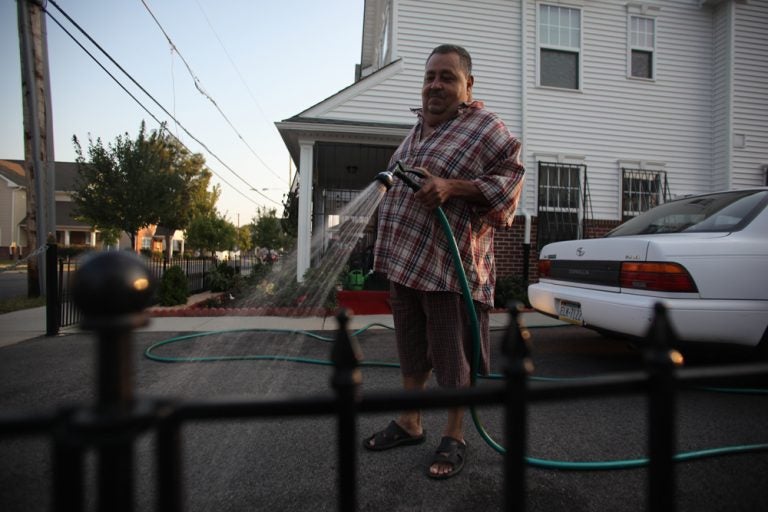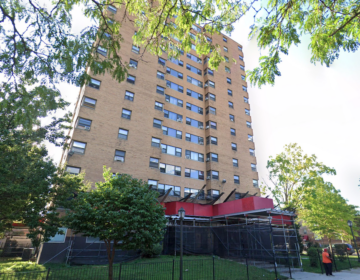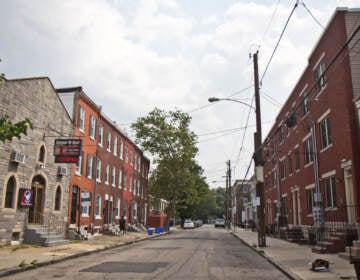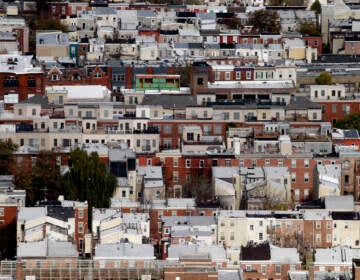How Trump’s budget would turn back the clock on progress in Philly’s neighborhoods
Trump's proposed FY2019 budget poses a massive threat to Philly's progress stabilizing neighborhoods, preventing foreclosures and fighting homelessness, city officials say.

Manuel Pomeles waters his garden in the North Central neighborhood revitalized with support from HUD's axed Choice Neighborhoods program. (Jake Blumgart/PlanPhilly)
President Donald Trump’s proposed fiscal year 2019 budget poses a massive threat to Philadelphia’s progress stabilizing neighborhoods, preventing foreclosures and fighting homelessness, city officials say.
Like other municipalities across the United States, Philly depends on funds from the Department of Housing and Urban Development (HUD) to combat poverty and blight, and keep people living in affordable homes. Money from the federal agency covers the cost of repairing 1,000 homes a year in the city’s low-income neighborhoods. It keeps 500 vacant lots litter free and supports small businesses in working-class areas. Federal funds even pay for foreclosure counseling that keeps 1,000 people a year in their homes.
But Trump’s proposed $6.8 billion HUD spending cut — a 14 percent reduction from the agency’s current $48 billion budget — could make all of that stop.
“All of these programs, all of these people, all of these businesses will be threatened by [Trump’s] budget,” says Chrystie. In addition to stripping the city of $38 million in Community Development Block Grant dollars and $8 million plus in HOME grant dollars that support the city’s anti-poverty and homelessness initiatives, the budget would devastate the Philadelphia Housing Authority, which relies heavily on support from Washington.
“This budget represents the most radical retrenchment of the federal government’s role in helping low-income households to afford decent, stable housing,” says Douglas Rice, a senior housing policy analyst with the Center on Budget and Policy Priorities.
Though PHA declined to discuss the budget proposal or its possible effects on the ambitious and controversial effort to redevelop the Sharswood neighborhood in North Philadelphia, it’s clear that the proposal would imperil the agency’s operations and forward progress on major initiatives.
The Public Housing Capital Fund would be scrapped entirely if Trump got his way, even though it funds badly needed repairs to a housing program with infrastructure that dates as far back as the 1930s.
In Philadelphia, the public housing stock needs, as of 2015, at least $1.5 billion in repairs. Nationally, the figure is closer to $30 billion, although that is likely a low estimate.
A program created by President Barack Obama that has proven pivotal to the city’s work to redevelop its out-of-date public housing supply is also being zeroed out. That program known as the Choice Neighborhoods Initiative, contributed $30 million to the redevelopment of the Norris Homes public housing complex in North Philadelphia and $500,000 to the PHA planning process now ongoing in Sharswood.
The Housing Choice Voucher Program, which has a waiting list of almost 14,000 in Philadelphia, would be cut by a fifth in Trump’s proposal as well. Colloquially known as Section 8, it is the nation’s largest affordable housing program, and advocates say that cuts to it would likely increase homelessness.
“We may see ourselves returning to a very dark era, where Philadelphia’s poverty crisis only deepens, further burdening the City with the collateral consequences of increased homelessness,” says Rasheedah Phillips, the managing attorney for Community Legal Services’ Housing Unit.
Trump’s budget accelerates and deepens a trend long in the making. Both CDBG and HOME used to provide even more funding to the city. In 2001, Philadelphia received $97.8 million in today’s dollars from CDBG. The $38 million the city gets today represents a 60 percent decline when adjusted for inflation. Chrystie says the dollars equal out in real value to the same amount received in the late 1970s.
“When you consider that these funds leverage other public, private, and foundation funds we’ve lost about a billion dollars,” says Chrystie. “But at no point has it been suggested there be no funding at all, that’s what separate this from the previous [15 years of] austere budgets.”
Presidential budgets are almost never enacted as they are proposed. Last year, Trump also threatened to eliminate the CDBG and HOME programs. When the smoke cleared, both were still standing thanks to Congress.
But Rice of the Center on Budget and Policy Priorities says presidential budgets are still important because they signal how the administration will approach an array of policy initiatives.
“The president’s budget represents a vision and set of priorities for the nation going forward,” says Rice. “Especially as he’s the leader of his party, with Republicans in charge in both the House and Senate.”
In this case, the Trump administration is signaling that it feels the federal government’s housing initiatives are too generous, even though they currently only reach a quarter of those eligible. As a result of this attitude, it has been reported in CityLab that the administration plans to raise rents on as many as 2 million households in public housing and impose work requirements on residents. Trump’s appointees have also acted to roll back fair housing regulations.
Rice says that cities and even states will be hard-pressed to make up for any lost funding. They have to run balanced budgets, unlike the federal government, and raising taxes to fund affordable housing for the poorest hasn’t been a priority in most parts of the country.
“It’s hard to imagine they could take up the slack,” says Rice. “The magnitude of federal resources is substantial enough that it’d be very difficult to replace them.”
WHYY is your source for fact-based, in-depth journalism and information. As a nonprofit organization, we rely on financial support from readers like you. Please give today.







